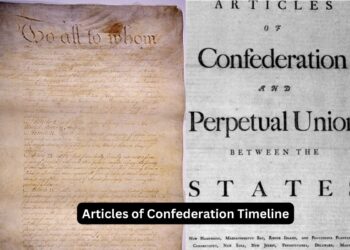“Once More to the Lake” is a famous essay written by E.B. White, an American writer and essayist, in 1941. The essay reflects on the passage of time and the cycle of life, as White recounts a visit to a lake in Maine that he had experienced as a child and now revisits with his own son.
Once More to the Lake Essay Summary By E.B. White-In the essay, White uses vivid descriptions and personal reflections to explore the themes of memory, mortality, and the nature of change. He starts by setting the scene of his return to the lake, describing the familiar sights and sounds that evoke a sense of nostalgia. As he spends time at the lake, he reflects on the similarities and differences between his current experience and the memories of his childhood.
Also Read:-
Once More to the Lake Essay Summary By E.B. White-White is struck by the realization that time has passed and that he has grown older. He finds himself observing his son as he engages in activities that he once did himself as a child. This juxtaposition of past and present leads White to reflect on the fleeting nature of life and the inevitable passage of time.
Once More to the Lake Essay Summary By E.B. White-Throughout the essay, White explores the idea of the “eternal present,” where past and present merge, and he becomes one with his memories. He also contemplates the concept of mortality and the cyclical nature of life, as he witnesses his son’s experiences mirroring his own.
“Once More to the Lake” is considered a classic piece of American literature due to its introspective nature and its ability to evoke a sense of nostalgia and reflection in the reader. It is a contemplative essay that raises existential questions about the human experience and the impact of time on our perceptions of ourselves and the world around us.
About E.B. White
Once More to the Lake Essay Summary By E.B. White-Elwyn Brooks White, commonly known as E.B. White, was an American writer born on July 11, 1899, in Mount Vernon, New York. He is regarded as one of the most influential figures in American literature, particularly known for his contributions to children’s literature and his essays.
White attended Cornell University, where he graduated in 1921. After college, he began his writing career as a reporter for The Seattle Times. He later worked as a freelance writer for various publications, including The New Yorker magazine. It was during his time at The New Yorker that he developed his distinctive writing style and gained recognition as an accomplished essayist.
Once More to the Lake Essay Summary By E.B. White-In addition to his essays, E.B. White made significant contributions to children’s literature. He published his first children’s book, “Stuart Little,” in 1945, which tells the story of a mouse born to human parents.
The book was well-received and became a classic. He followed it up with his most famous work, “Charlotte’s Web,” in 1952, which tells the story of a spider named Charlotte and her friendship with a pig named Wilbur. “Charlotte’s Web” is considered one of the greatest children’s books of all time and has won numerous awards.
Once More to the Lake Essay Summary By E.B. White-E.B. White’s writing was characterized by his precise and evocative language, his ability to capture the essence of human experiences, and his deep appreciation for nature and animals. His works often explore themes such as friendship, love, loss, and the complexities of the human condition.
Once More to the Lake Essay Summary By E.B. White-In addition to his children’s books and essays, White co-authored “The Elements of Style” in 1918 with his professor William Strunk Jr. This renowned guide to English grammar and style is widely used and considered a valuable resource for writers.
E.B. White received several prestigious awards for his literary contributions, including the Laura Ingalls Wilder Medal and a special Pulitzer Prize for his body of work.
Once More to the Lake Essay Summary By E.B. White-He passed away on October 1, 1985, at the age of 86, leaving behind a significant legacy in American literature. His works continue to be celebrated and cherished by readers of all ages.
Conclusion
Once More to the Lake Essay Summary By E.B. White-The essay’s themes of nostalgia, the eternal present, and the interconnectedness of past and present resonate with readers and invite them to reflect on their own experiences and the impact of time on their lives.
White’s skillful storytelling and introspective tone make “Once More to the Lake” a timeless piece of literature that continues to captivate readers and provoke thought about the human condition.
Ultimately, “Once More to the Lake” serves as a reminder of the impermanence of life and the importance of cherishing moments and connections with loved ones.
Once More to the Lake Essay Summary By E.B. White-It urges us to embrace the present, while also acknowledging the interconnectedness of our past experiences. Through White’s lyrical prose, the essay invites us to contemplate our own mortality and to find meaning and beauty in the ever-changing cycle of life.
FAQ.
Q: When was E.B. White born?
A: E.B. White, whose full name was Elwyn Brooks White, was born on July 11, 1899.
Q: What other notable works did E.B. White write?
A: E.B. White is best known for his contributions to children’s literature, particularly for his books “Charlotte’s Web” (1952) and “Stuart Little” (1945). He also co-authored “The Elements of Style” (1918), a widely respected guide to English grammar and style.
Q: Did E.B. White win any awards for his writing?
A: Yes, E.B. White received several awards and honors throughout his career. He was awarded the Laura Ingalls Wilder Medal in 1970 for his lasting contributions to children’s literature. He also received a special Pulitzer Prize in 1978 for his body of work as a distinguished and versatile essayist, humorist, and author.
Q: What was E.B. White’s writing style like?
A: E.B. White’s writing style was known for its clarity, simplicity, and elegance. He had a talent for vividly describing scenes and characters, often with a touch of wit and humor. His prose was accessible to readers of all ages, and he had a unique ability to convey deep emotions and profound ideas in a relatable and engaging manner.
Q: When did E.B. White pass away?
A: E.B. White passed away on October 1, 1985, at the age of 86.
















